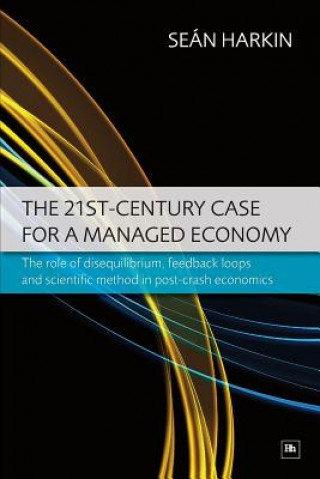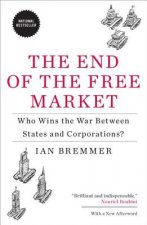
Kod: 04325908
21st Century Case for a Managed Economy
Autor Sean Harkin
This book argues that the scientific concept of feedback - the idea that change in some element of a system can cause further change in that element - represents a general concept of economic change. Positive feedback causes runaw ... więcej
- Język:
 Angielski
Angielski - Oprawa: Miękka
- Liczba stron: 258
Wydawca: Harriman House Publishing, 2010
- Więcej informacji o książce

28.58 €
Zwykle: 30.75 €
Oszczędzasz 2.17 €

Dostępna u dostawcy
Wysyłamy za 15 - 20 dni
Zobacz książki o podobnej tematyce
-

New History of Italian Renaissance Art
69.66 € -

Born-Jordan Quantization
61.30 € -

100 Years of Vintage Watches
38.35 € -

CD-My sme malí muzikanti- 2 CD
8.04 € -24 % -

Jo-Jo Sprachbuch - Allgemeine Ausgabe 2011 - 3. Schuljahr
13.28 € -

Rosamunde Pilcher Giftpack
33.01 € -4 % -

Controlling von Produktbaukästen
37.34 € -10 % -

Internationalism, National Identities, and Study Abroad
97.14 € -

26th Ohio Veteran Volunteer Infantry
40.46 € -

Bioaktivnost' modificirovannyh guminovyh kislot
51.94 € -9 % -

Boundary Layer Flow over Elastic Surfaces
123.92 € -5 % -

21st Century Camp Follower
34.72 € -

Twenty Days in Kuwait
22.64 € -

Accidental Diarist
41.87 €
Podaruj tę książkę jeszcze dziś
- Zamów książkę i wybierz "Wyślij jako prezent".
- Natychmiast wyślemy Ci bon podarunkowy, który możesz przekazać adresatowi prezentu.
- Książka zostanie wysłana do adresata, a Ty o nic nie musisz się martwić.
Więcej informacji o 21st Century Case for a Managed Economy
Za ten zakup dostaniesz 72 punkty
 Opis
Opis
This book argues that the scientific concept of feedback - the idea that change in some element of a system can cause further change in that element - represents a general concept of economic change. Positive feedback causes runaway change, such as a market bubble, inflation or long-run growth, while negative feedback causes stability and stasis. Emphasising both kinds of feedback stands in contrast to the equilibrium theories of classical economics which, in effect, emphasise negative feedback only. In practical terms, the feedback perspective implies a need for extensive government involvement in the economy to suppress undesirable feedback effects - such as those causing wild instability or self-perpetuating inequality - while supporting desirable feedback effects - such as those causing economic growth. -------------------- For decades, free-market economists have told a consistent story. Markets are rational, efficient, stable and fair, and even volatile financial markets should be left mostly to their own devices. The economic crisis that began in 2007 has, however, disproven such belief in the perfection of markets. The reason market fundamentalism fails is simple: it is built on economic theories that incorporate only one half of how the economy actually operates. These theories focus on a concept of long-run equilibrium that sees the economy as being continually drawn back to balance after any change from this position, in a form of what scientists would call negative feedback. However, there is also positive feedback; a process whereby a given change amplifies itself until the system is driven far from equilibrium, and this phenomenon is equally visible in the economy. Positive feedback drives economic growth, speculative bubbles, inflation, recessions, deflation and self-perpetuating inequality. It is what gives us the secular trends and cyclical fluctuations we observe in the real economy. And it deserves to be a central part of our economic theory. This book makes a first attempt at applying the concept of feedback to economic theory and economic policy. It recognises that the state must support desirable feedbacks while suppressing undesirable ones. But it also recognises that central planning leads to oppression and inefficiency. This leads us back to the common-sense idea of a mixed economic system in which the role of the state is almost as great as that of the market.
 Szczegóły książki
Szczegóły książki
Kategoria Książki po angielsku Economics, finance, business & management Economics Economic systems & structures
28.58 €
- Pełny tytuł: 21st Century Case for a Managed Economy
- Autor: Sean Harkin
- Język:
 Angielski
Angielski - Oprawa: Miękka
- Liczba stron: 258
- EAN: 9781906659547
- ISBN: 1906659540
- ID: 04325908
- Wydawca: Harriman House Publishing
- Waga: 410 g
- Wymiary: 234 × 156 × 13 mm
- Data wydania: 12. April 2010
Ulubione w innej kategorii
-

23 Things They Don't Tell You About Capitalism
11.27 € -23 % -

Entrepreneurial State
12.17 € -22 % -

Origin of Capitalism
13.58 € -35 % -

Mystery Of Capital
22.24 € -

Planning for Freedom: Let the Market System Work
12.17 € -5 % -

End Of The Free Market
21.64 € -13 % -

Road to Serfdom
12.17 € -15 % -

Connectography
10.26 € -20 % -

Humankind
18.51 € -12 % -

Capitalism in America
15.19 € -28 % -

Capitalism
26.27 € -15 % -

EU General Data Protection Regulation (GDPR)
174.97 € -

The Happiness Industry
12.68 € -13 % -

Enigma of Capital
10.36 € -27 % -

Capitalism
17.61 € -11 % -

Third Pillar
29.19 € -

Poland's Return to Capitalism
53.35 € -

Coca-Cola
14.79 € -19 % -

Truth About Markets
15.29 € -27 % -

Capitalism 4.0
15.09 € -18 % -

Neoliberalism
25.16 € -

Cognitive Capitalism
23.45 € -7 % -

Economics for Everyone
29.29 € -9 % -

Once Upon a Time in Russia
9.35 € -21 % -

Capitalism and Modernity - The Great Debate
30.19 € -

New Capitalist Manifesto
25.56 € -16 % -

From Gold to Euro
120.80 € -

Capitalism without Democracy
40.06 € -

Cancer Stage of Capitalism
41.77 € -

Humanizing the Economy
20.83 € -19 % -

Fair Division and Collective Welfare
49.82 € -

Brexit
16.90 € -4 % -

Nowa Huta
56.77 € -

Power of Capitalism
23.04 € -18 % -

Guide to Marxian Political Economy
85.06 € -4 % -

History of Capitalism
31.70 € -

Capitalism and Its Alternatives
32.91 € -

Liquidity Lost
126.74 € -

That Which is Seen, and That Which is Not Seen
19.12 € -

How Ukraine Became a Market Economy and Democracy
34.12 € -

Anti-capitalism
10.66 € -25 % -

Lectures in Macroeconomics
70.77 € -

Entrepreneurship and Innovation: An Economic Approach
78.82 € -

Six Capitals, or Can Accountants Save the Planet - Rethinking Capitalism for the Twenty-First Century
23.15 € -9 % -

Romania
84.36 € -

A-Z of Capacity Management
38.55 € -

Producing Prosperity
81.03 € -

Civil Economy
29.49 € -

Die Donut-Ökonomie (Studienausgabe)
17.10 € -14 %
Osobní odběr Bratislava a 2642 dalších
Copyright ©2008-24 najlacnejsie-knihy.sk Wszelkie prawa zastrzeżonePrywatnieCookies


 Vrácení do měsíce
Vrácení do měsíce Zdarma od 49.99 €
Zdarma od 49.99 € 02/210 210 99 (8-15.30h)
02/210 210 99 (8-15.30h)